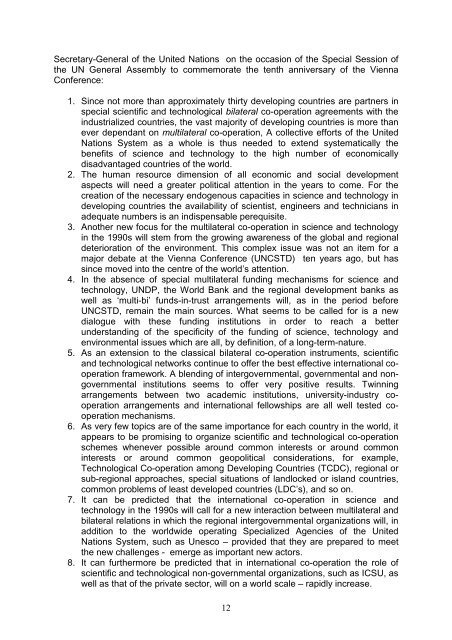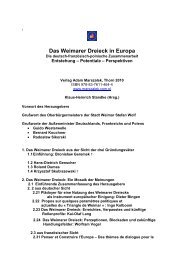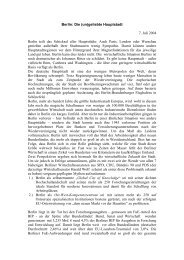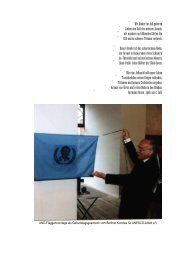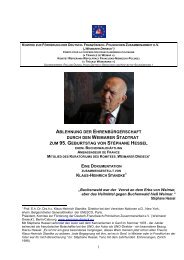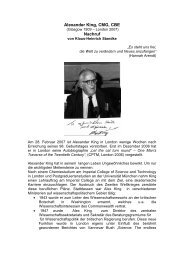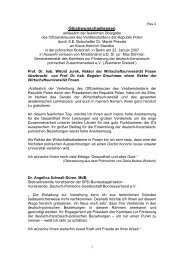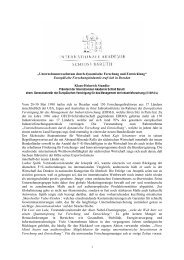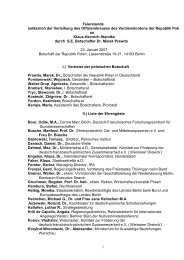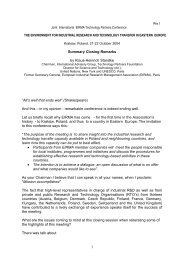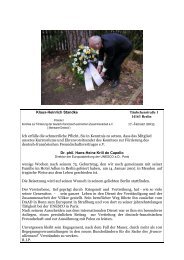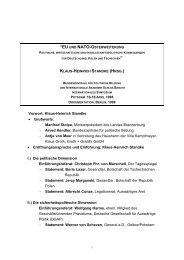Science and Technology for the Future,Contents, Preface ...
Science and Technology for the Future,Contents, Preface ...
Science and Technology for the Future,Contents, Preface ...
You also want an ePaper? Increase the reach of your titles
YUMPU automatically turns print PDFs into web optimized ePapers that Google loves.
Secretary-General of <strong>the</strong> United Nations on <strong>the</strong> occasion of <strong>the</strong> Special Session of<br />
<strong>the</strong> UN General Assembly to commemorate <strong>the</strong> tenth anniversary of <strong>the</strong> Vienna<br />
Conference:<br />
1. Since not more than approximately thirty developing countries are partners in<br />
special scientific <strong>and</strong> technological bilateral co-operation agreements with <strong>the</strong><br />
industrialized countries, <strong>the</strong> vast majority of developing countries is more than<br />
ever dependant on multilateral co-operation, A collective ef<strong>for</strong>ts of <strong>the</strong> United<br />
Nations System as a whole is thus needed to extend systematically <strong>the</strong><br />
benefits of science <strong>and</strong> technology to <strong>the</strong> high number of economically<br />
disadvantaged countries of <strong>the</strong> world.<br />
2. The human resource dimension of all economic <strong>and</strong> social development<br />
aspects will need a greater political attention in <strong>the</strong> years to come. For <strong>the</strong><br />
creation of <strong>the</strong> necessary endogenous capacities in science <strong>and</strong> technology in<br />
developing countries <strong>the</strong> availability of scientist, engineers <strong>and</strong> technicians in<br />
adequate numbers is an indispensable perequisite.<br />
3. Ano<strong>the</strong>r new focus <strong>for</strong> <strong>the</strong> multilateral co-operation in science <strong>and</strong> technology<br />
in <strong>the</strong> 1990s will stem from <strong>the</strong> growing awareness of <strong>the</strong> global <strong>and</strong> regional<br />
deterioration of <strong>the</strong> environment. This complex issue was not an item <strong>for</strong> a<br />
major debate at <strong>the</strong> Vienna Conference (UNCSTD) ten years ago, but has<br />
since moved into <strong>the</strong> centre of <strong>the</strong> world’s attention.<br />
4. In <strong>the</strong> absence of special multilateral funding mechanisms <strong>for</strong> science <strong>and</strong><br />
technology, UNDP, <strong>the</strong> World Bank <strong>and</strong> <strong>the</strong> regional development banks as<br />
well as ‘multi-bi’ funds-in-trust arrangements will, as in <strong>the</strong> period be<strong>for</strong>e<br />
UNCSTD, remain <strong>the</strong> main sources. What seems to be called <strong>for</strong> is a new<br />
dialogue with <strong>the</strong>se funding institutions in order to reach a better<br />
underst<strong>and</strong>ing of <strong>the</strong> specificity of <strong>the</strong> funding of science, technology <strong>and</strong><br />
environmental issues which are all, by definition, of a long-term-nature.<br />
5. As an extension to <strong>the</strong> classical bilateral co-operation instruments, scientific<br />
<strong>and</strong> technological networks continue to offer <strong>the</strong> best effective international cooperation<br />
framework. A blending of intergovernmental, governmental <strong>and</strong> nongovernmental<br />
institutions seems to offer very positive results. Twinning<br />
arrangements between two academic institutions, university-industry cooperation<br />
arrangements <strong>and</strong> international fellowships are all well tested cooperation<br />
mechanisms.<br />
6. As very few topics are of <strong>the</strong> same importance <strong>for</strong> each country in <strong>the</strong> world, it<br />
appears to be promising to organize scientific <strong>and</strong> technological co-operation<br />
schemes whenever possible around common interests or around common<br />
interests or around common geopolitical considerations, <strong>for</strong> example,<br />
Technological Co-operation among Developing Countries (TCDC), regional or<br />
sub-regional approaches, special situations of l<strong>and</strong>locked or isl<strong>and</strong> countries,<br />
common problems of least developed countries (LDC’s), <strong>and</strong> so on.<br />
7. It can be predicted that <strong>the</strong> international co-operation in science <strong>and</strong><br />
technology in <strong>the</strong> 1990s will call <strong>for</strong> a new interaction between multilateral <strong>and</strong><br />
bilateral relations in which <strong>the</strong> regional intergovernmental organizations will, in<br />
addition to <strong>the</strong> worldwide operating Specialized Agencies of <strong>the</strong> United<br />
Nations System, such as Unesco – provided that <strong>the</strong>y are prepared to meet<br />
<strong>the</strong> new challenges - emerge as important new actors.<br />
8. It can fur<strong>the</strong>rmore be predicted that in international co-operation <strong>the</strong> role of<br />
scientific <strong>and</strong> technological non-governmental organizations, such as ICSU, as<br />
well as that of <strong>the</strong> private sector, will on a world scale – rapidly increase.<br />
12


